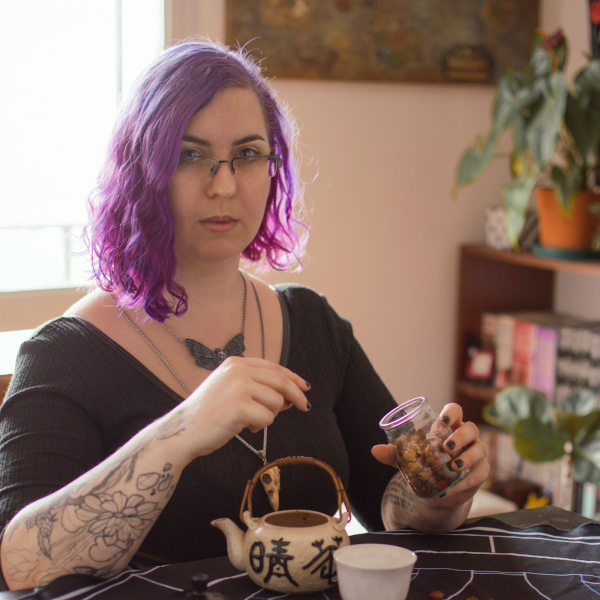Interviews with Olim
Each month, we interview an oleh or olah for our newsletter.
We invite you to read the stories of LGBTQ+ people who have made Israel their home.
"I already fell in love with the country 10 years ago..."
Interview date: August 2023
Q. Where were you born and where did you grow up?
A. I was born in Buenos Aires, Argentina. Raised in Mar del Plata, a port city south of Buenos Aires, and then moved back to Buenos Aires when I was in my 20s.
Q. At what age did you come out? And how did it go?
A. I don’t recognize a “coming out” moment in my history, because it happened in different situations with different people. With my mom, for example, it was more like a “yeah, I’m dating all over the gender pool. I’ll let you know if anything becomes formal”. I was probably twentysomething.
My sister was the first to introduce a girlfriend to our mom, and it did not go well, until mom came around a month later.
Now she’s mostly ok with having two bisexual/pansexual daughters, but it’s obvious she’s extra happy if any new date is male. Nothing to do there. She’s still welcoming of our partners, regardless of their gender.
Q. Were you involved at all in the LGBT community in your previous country?
A. A bit, mostly because it took me a long time to understand I didn’t need to be dating a woman to recognize myself as part of the community, probably a very bisexual problem.
But before, I was running an NGO oriented to geeks and nerds, and I made sure we had a close relationship with the LGBTQ+ organizations. We were hosting talks and activities, and making everyone feel welcome.
Q. What is your involvement (if any) in the LGBT community in Israel?
A. This wonderful group is my main point of local involvement, and I love it. It’s amazing to be sharing the experience of being an immigrant AND being LGBTQ+.
Q. How long since you made Aliyah?
A. 5 months!
Q. Did you move here on your own or with family/friends/significant other?
A. On my own. I joined a MASA program with the intention to only be here for 10 months. The program was… not successful, but it allowed me to be here and get a feel of the country and made me decide to stay.
Q. Why did you make Aliyah?
A. I already fell in love with the country 10 years ago when I did Taglit, but hadn’t considered making Aliyah. But now, experiencing everyday life, and seeing how I fit in, I couldn’t help myself.
Q. How is it going so far?
A. Amazing. It was not easy, the first months were exhausting. I made Aliyah from here, not from Argentina, and it was a painfully bureaucratic process, where very few people treated me like a human being rather than a document. No one would explain anything to me, and I had to fight my way to get all my paperwork in order. It was exhausting, especially if you come alone and with no support network (and without Hebrew). I do not recommend doing it like I did. But then I found a job and an apartment and things began looking bright again. Now I feel settled, connected and surrounded by friends.
Q. What do you do in terms of work?
A. I’m a project manager who jumped between industries a lot (and dedicated full time to art for a couple years, starting during the pandemic). Now, I’m working in the pharma industry, adding data analysis knowledge and skills, which I find fascinating. I’m also thinking about moving my career towards positions where I’m between the IT/tech people, and the business/users. I really enjoy finding solutions, optimizing processes and translating needs into actionable steps.
Q. How is your Ivrit?
A. Non-existent yet 🙂 But I’m planning to start an ulpan soon, if I can find something in the evenings.
Q. What has been your biggest challenge so far?
A. Anything legal/bureaucratic… I developed a method: if I am, let’s say, at the post office, and no one seems to want to cooperate with me and explain to me how I can get my documents… I cry! It works like a charm. Jokes aside, it’s really hard when information is not available or hard to find, with the language barrier, and a whole system that looks nothing to the one you are used to. It feels terrible as an adult to have to ask for help for very basic things that I’m used to doing on my own, like getting a doctor’s appointment, or something from the bank.
Q. How do you perceive the Israeli LGBT community?
A. I have the feeling it’s divided into many little groups, and could benefit from some larger-scale organization. I like how open Tel Aviv is about it, how you can see pride flags everywhere and the freedom to just be ourselves.
Q. How is being LGBT in Israel different to your where you lived previously?
A. I was at Tel Aviv Pride and it was wonderful, but smaller than what I’m used to. I’m impressed by the support from the municipality, and disappointed in the lack of national support. In Buenos Aires it is exactly the other way around.
Q. If you were making Aliyah now, would you do anything differently?
A. Yes, I would definitely do it from Argentina and not from here, take a full time ulpan for the first months, and then get into the job market. But naturally it is not that easy when gathering the minimum amount of money for that in Argentina is near impossible nowadays. I hope there is more government support for Argentinian Jews, and that they don’t touch the Law of Return.
Victoria

Our Newsletter
Sign up if you would like to receive a monthly email listing events of interest to LGBT English-speakers in Israel, an interview with an oleh/olah and other useful information.
Want to be interviewed?
Complete the form below and we will get back to you.
Our Newsletter
Sign up if you would like to receive a monthly email listing events of interest to LGBT English-speakers in Israel, an interview with an oleh/olah and other useful information.
Want to be interviewed?
Complete the form below and we will get back to you.


